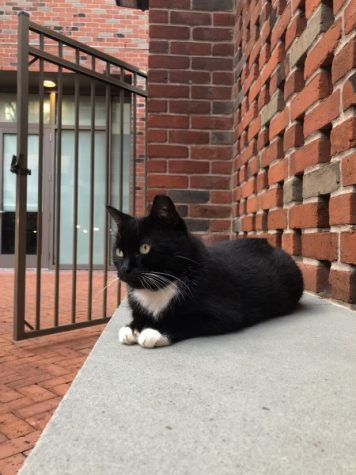Tulane cancels plan to relocate campus cats after pushback from community

Tulane has a long tradition of caring for its cats. From the monument erected after Cow Cat’s death last January to the cat condos in the Academic Quadrangle, the university has established itself as a home for cats.
Recently, however, the university has received complaints about the cats, prompting discussion as to their future on campus.
“In recent months, Tulane received complaints of flea bites, dead quarry, building damage and an increase in the rodent population attracted to food left for the cats,” Executive Director of Public Relations Mike Strecker said in a press release.
In response, Tulane planned to transport the cats to the Tulane University Herbert Research Center in Belle Chasse. According to Strecker, a bunker on the facility would have provided shelter for the cats, and arrangements were made to provide them with food and water.
On Monday, Chief Trapper for Campus Cats Barb Ryan sent an email to the Campus Cats listserv informing the Tulane community of the decision and expressing concern for the cats’ safety and well-being.
On Tuesday, after pushback from the community, including a petition signed by 1,033 community members to keep the cats on campus, Tulane reversed its original decision.
In her email, Ryan said she was concerned coyotes and other wild animals would pose a danger to the cats. She also stated that removing these cats would not permanently remove cats from campus.
“It is a well-known fact that removing cats from an area creates a vacuum, so you will have new, unfixed cats come in and a continuous population increase,” Ryan wrote. “It is better to have a colony of fixed cats where the population is controlled, than constantly removing and trapping that cats that come in.”
Sophomore Jennifer Li created a GroupMe in support of the campus cats. On Tuesday, Li’s GroupMe peaked at more than 80 Tulane students.
Li and other students encouraged community members to write to Campus Services to complain about the new policy. According to Li, the campaign was a success.
“I am on the Campus Services Advisory Board and they said that they didn’t know how many people actually ‘cared’ about the campus cats,” Li said. “They were getting responses from social media and from emails from students and professors and even alumni about how the cats should stay on campus. So I would say the community’s response really played a huge role in changing this decision.”
Another student, Nina Mazzella, wrote a petition to keep the cats on campus and collected 1,033 signatures.
“We have a had a long-time colony of cats that Tulane has come together and cared for; these cats are part of who we are and what we value as members of Tulane,” Mazzella wrote in the petition.
Psychology professor of practice Carrie Wyland, a Faculty in Residence member in Wall Residence Hall, also stated the cats are an important part of the Tulane community.
“I think they do provide comfort,” Wyland said. “A lot of residents miss their pets and miss their animals at home, and I see a lot of students that are cuddling with the cats, and talking to them, and taking selfies with them, which I think is a really special part of our community.”
Feedback from the community did not go unheard. On Tuesday, the university decided to reverse its original decision.
”The university has decided not to remove the cats from the uptown campus and instead identify ways to ensure a safer and healthier environment for the cats and our students, faculty and staff,” Eric Allen, operations manager for the office of the president at Tulane University, said in an email.
According to Strecker, the university has and will continue to protect its cat population through support for spaying and neutering and erecting cat condos on campus.
Randy Philipson, Vice President of Facilities, Campus Development and Services, said he hopes to balance the university’s cat population with the needs of its students.
“We will work with the LASPCA [The Louisiana Society for the Prevention of Cruelty to Animals], the occupants of campus buildings where the cats — and wild animals attracted by their food — have caused damage, the Campus Cats organization and others, to determine how to continue to maintain a safe environment for the Tulane community, the cats and our buildings,” Philipson said.
Your donation will support the student journalists of Tulane University. Your contribution will allow us to purchase equipment and cover our annual website hosting costs.



Leave a Comment